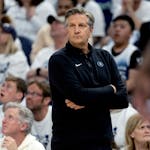A flurry of moves over the last five days has served to further reshape the Timberwolves' roster.
President Gersson Rosas and his staff drafted three players in the first round Wednesday — most notably Anthony Edwards with the No. 1 overall pick — added Ricky Rubio in a headline-worthy trade, then re-signed priority restricted free agents Malik Beasley and Juancho Hernangomez.
Amid all that, it might be easy to overlook what seems like an "oh by the way" transaction Sunday: trading salary/roster fillers Omari Spellman and Jacob Evans, along with a future second round pick, to the Knicks for veteran big man Ed Davis.
While Edwards is the most important move (by far) for the long run, Rubio is the most interesting and fun move and deals for Beasley and Hernangomez are the types of deals that can make the Wolves more competitive for the duration of Karl-Anthony Towns' contract, Davis might end up being the new player who has the most significant impact on how the Wolves play in the short-term — a season that begins in less than a month.
Davis has proven adept over the course of his career in both offensive and defensive pick and roll situations. At 6-9, with a 7-2 wingspan, Davis is good at contesting shots, grabbing rebounds and snaring both putbacks and passes for dunks.
So? There are a lot of players like that in the NBA.
Yes. And the Wolves haven't really had one for a while. That single deficiency doesn't explain all of their defensive woes in recent seasons, even as Tom Thibodeau and then Ryan Saunders (and staff) looked to improve it with schemes and effort.
But a player like Davis is particularly useful in the modern NBA — and perhaps even more so when paired with Towns, an offensive unicorn and a defensive albatross.
Davis knows what Wolves assistant David Vanterpool, in charge of the defense, wants on that end of the court after playing three seasons in Portland while Vanterpool was an assistant there. And he knows what Pablo Prigioni, in charge of the Wolves' offense, wants on that end of the court after playing with the Nets in 2018-19 while Prigioni was there.
Perhaps even more importantly, Davis thrived in 2018-19 with the Nets while D'Angelo Russell was enjoying his best NBA season there and making an All-Star team.
Local NBA writer Dane Moore has the valuable numbers: The Nets were 11.7 points per 100 possessions better in 2018-19 when Davis and Russell were on the court together than when Russell was on the court without Davis. Almost all of that positive difference came on the defensive end, but they were slightly better on offense as well.
Without poring through thousands of Nets possessions from that season, my hunch is that Davis' work as a team defender and his ability to cover in pick-and-roll situations was a huge boon on defense to the similarly challenged Russell. And on offense, he was a willing target for dunks and putbacks — as you can see on this highlight package.
In that season, Davis finished No. 9 out of 96 power forwards in defensive real plus-minus. The two main power forwards the Wolves employed — Dario Saric and Taj Gibson — finished No. 89 and No. 91, respectively.
Last year's Wolves featured a lot of Robert Covington and Jake Layman at power forward — then eventually some James Johnson and Hernangomez after the trade deadline. All of them functioned more as "stretch fours," making up for being undersized to varying degrees by being able to create favorable offensive matchups with their shooting ability.
Covington is gone. Layman and Hernangomez return and figure to function nicely as stretch fours during certain parts of the game, with Hernangomez getting the bulk of the minutes as a presumed starter with his new contract (two years plus an option). No. 28 pick Jaden McDaniels is a long-term project.
Davis should have a clear and important role: Give the Wolves 15-20 minutes per game as a backup — either alongside Towns as a power forward or in place of Towns at center — while delivering valuable offense and defense at the rim and sometimes even being in a game-closing lineup.
Davis is not a stretch four in any sense. He has attempted exactly four three-pointers in his 668-game, six-team NBA career. Davis has made none.
But I dare say the Wolves haven't had a player with a similar role since the second coming of Kevin Garnett in 2015-16. I would not suggest Davis, a career backup, should be a straight 1 for 1 comparison with a Hall of Famer legendary for his defense and intensity.
But as a player type, particularly at that stage of KG's career? He is a fair enough match. The Wolves were a very good defensive team when Garnett was on the court that season. Then Thibodeau decided he didn't want him any more, and the middle became a mess for the back half of the decade.
If Davis can restore some order, he could end up being the most important new player on the court next season.





